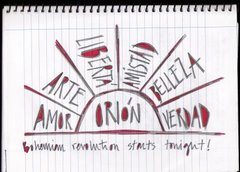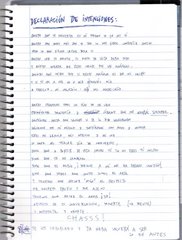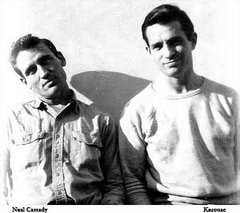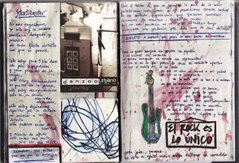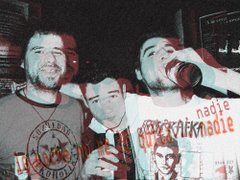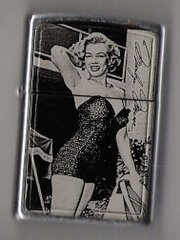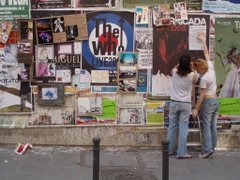Permanente estado de duermevela
1 BORGES. El periodista de las estrellas
Si de algo sirven los sueños, y más aun los que se repiten, es para contactar con uno y susurrarle suave "date cuenta". Permaneciendo alerta, para la próxima vez que atravesemos aquella circunstancia concreta que llamó nuestra atención, podemos adentrarnos tirando de un mínimo grado de consciencia y amoldarla a nuestro antojo. No es tan complicado como suena, al fin y al cabo sigo hablando de sueños, quién no los tiene; comienza entonces una suerte de viaje astral.
[Es verdad que todo esto puede quedar en fantasía, y que meditadores y científicos se han podido estar reuniendo secretamente en desvanes oscuros para ponerse de acuerdo en cómo engañarnos durante todo este tiempo, o que quien divague sea yo (que casi seguro que no entendí nada), pero en todo caso, qué bonito, y por otra parte, sigamos].
En teoría, el alma abandona el cuerpo y echa a caminar a voluntad por el universo. Uno es libre de visitar lo que quiera. Tanto de volver a un instante congelado en el tiempo, como de recorrer un espacio que sigue vigente en algún recoveco de su memoria por la razón que sea.
Hablo en pasado porque avistar el futuro se nos queda algo pretencioso, pero aparcando en doble fila el escepticismo mientras espero a la salida del colegio a los niños, quiero pensar que todo es posible.
Acaso el motor de cada desdoblamiento no deje de ser curiosidad, así como el amor de ésta, y la supervivencia concluyendo el rompecabezas.
La diferencia entre el dominio que pueda mantener una u otra persona sobre esta no-tan-inusual experiencia, puede que sea una cuestión de ganas, de no hacer pereza, o más probablemente, que sepa qué le está pasando. Que no se angustie porque se le agarrote el cuerpo. Que recuerde que ya casi todo tiene nombre.
Y bien, todo este camino gracias a Dios por fin ya andado, a donde quiere llegar es al Aleph que por naturaleza hemos tenido desde siempre más a mano: los sueños.
Claro que no es lo mismo un plano mental que un supuesto punto físico, pero sí parecen compartir la característica que los fundamenta: ser un trance cósmico.
Y ahora vayamos por partes.
Según Borges -esta vez en por boca de Carlos Argentino Daneri-, "un Aleph es uno de los puntos del espacio que contienen todos los puntos".
Es una pequeña esfera tornasolada cuyo centro está en todas partes y la circunferencia en ninguna.
También se dijo que tiene la forma de un hombre que señala el cielo y la tierra, para indicar que el mundo inferior es el espejo y es el mapa del superior.
Mirándolo se ve cada objeto, cada lugar, cada ser a lo largo de la Historia, cada acto o espectáculo del planeta, y además, desde todos sus ángulos y en el mismo momento. Es como tener la Sabiduría delante. Muestra todo lo sentido, todo lo pensado, muestra el aire. La civilización egipcia, los besos, los lagartos. Resulta ridículo comenzar a enumerar, si en el fondo el hecho ocurre de manera simultánea; nada va al final y nada va primero. No hay superposición o transparencia, y es ahí que reside su magia.
En definitiva, esta ilusión reflexiona sobre la profundidad de lo inexplicable desde una dimensión de dimensiones. Imaginación de imaginaciones. No cabe en vulgares convencionalismos porque es indiscutible y su procedencia no atiende a la lógica.
Intentar encerrar este fenómeno en absurdas definiciones es tan imposible como innecesario. Su función radica en ser visto, con toda su alegría, con todo el daño.
Puede quedarnos clara la idea de eterno o eternidad, así, superficialmente. Y en cierta medida, con eso tendremos que conformarnos porque el concepto en sí es más que inabarcable. Es inconcebible. Y aun así, ya lo hemos conseguido.
Internet.
2 Todo está relacionado
A estas alturas, uno no sabe si sentarse a la cama a las seis con los ojos cerrados, si abrirse una cuenta Blogger y comentar lo rico que está todo lo del Starbucks, si mirar fijamente las bombillas esperando una respuesta para quedarse luego nada más que con las manchas, si echarse a la calle preparado para lo que venga, si plantarse delante de cualquier puerta y no moverse hasta que entre Sartre, o en serio hundirse al telediario de la noche, donde dan 20 minutos a la nevada y 3 a la guerra.
Generación Einstein .Uno no sabe.
...es verdad, realidad y ficción se entremezclan. A la inocencia se la ha comido la mercadotecnia, y al conjunto de estímulos al que nos vemos sometidos en el día a día (las brisas del metro, la luz fluorescente, el calor, el frío, el hambre, la subjetividad del tiempo, los nervios...), hay que añadirle la de publicidad que hay por todas partes.
Se hace difícil escapar de la paranoia de que por algún sitio tiene que haber cámaras ocultas. Burlándose.
Desde la Revolución Industrial (2ª mitad del s.XVIII - principios del s.XIX), la ciencia se puso al servicio del hombre.
Hoy en día Internet es una realidad tecnológica, una herramienta más, algo cotidiano. Una genialidad a la que, lejos de quedarnos paralizados con la boca abierta, nos hemos ido acostumbrando. Es más, creamos nuestro propio rinconcito en medio de todo el espacio.
Y es increíble. Ahora mismo quien no es un experto en dinosaurios o zares de Rusia, por ejemplo, pues es porque no quiere. La información está ahí, es escalofriante, el espejismo se ha materializado.
Desde luego, se trata del invento más "democrático" en tanto posibilita ejercer tanto el Derecho a la Información, como el de la Libre Expresión. Se accede de manera instantánea, se navega investigando sobre lo que se esté interesado, subida y bajada de archivos, compra online, contactar con quien sea, gestiones, trabajo...
Una primera lectura no hará más que augurar los primeros pasos de la Aldea Global , lo cual suena muy bonito, pero por lo visto ni sus estudiosos saben con exactitud qué es. O mejor dicho, ni hasta dónde da de sí, ni sus consecuencias.
El término (que ha recibido innumerables críticas) lo acuñó Marshall McLuhan, del cual decían ser el más académico de entre los hippies y viceversa. Un visionario de la era de las comunicaciones que aseguraba que poco a poco el destino de los cibernautas irá definiéndose en una toma de conciencia colectiva capaz de unirnos más los unos con los otros. Que emisor y receptor acaben manteniendo un diálogo directo, básicamente.
De su famosa frase "el medio es el mensaje" (y siguiendo sus propios pasos a la hora de interpretarla), por una parte llegamos a la conclusión de que ambos elementos son interdependientes el uno del otro, y por otra, que se contienen.
[En todo caso, en mi opinión esa sentencia lo que tiene de rotunda, lo tiene de incompleta.
No se explica por sí sola.
De nuevo el conflicto entre la cultura escrita y la electrónica; hace tiempo escribí "si los informáticos supieran más de literatura, y los literatos más de informática, el link sería una metáfora".
Aunque puede que mi paradigma tampoco se esté quieto].
McLuhan olvida el efecto afterpop y la distorsión mediática. Que el hecho de que esté todo lleno de palabras no tiene por qué significar que haya ni una sola frase coherente.
Olvida la manipulación de noticias, la confusión que generan fuentes contradictorias, la basura anónima, los casos de mafias, las estafas, la pederastia... ¿Sigo?
Cuando internet no posa para la foto. Debemos ir con pies de plomo y aprender a distinguir. Mirar desde todas las perspectivas para prevenir riesgos. Todo poder fuera de control nos tiene vendidos.
De todas maneras, este planteamiento -más que utópico, megalómano- no deja de ser una de las caras de la moneda.
La otra es que como siempre, y desde que el mundo es mundo, si hay 10, para que yo tenga 6 otro ha de quedarse con 4. La Teoría de la Dependencia y que una muerte no signifique lo mismo en Indonesia que en Bélgica, así de claro.
El reparto no es equitativo, sigue la sociedad dividida, sigue habiendo arriba y abajo.
No todos los habitantes del planeta tienen acceso a la red. Hay un abismo entre las necesidades (reales o inventadas) del Primer y el Tercer Mundo , y esta vez puede que la culpa no sea de las multinacionales, sino de los propios usuarios, que hacen que esto siga girando.
3 Ciencia-ficción
Hablando de toda esta serie de eurekas en las que quién lo diría, y en contra del vértigo que produce en sí lo rápido que va nuestro tiempo... tal vez sea hora de volver a nuestros orígenes, apagar los móviles, y sin distracciones encender una vela en señal de redención. Te recordamos, palabra.
Y es que así es. A esta percepción metafísica primera de la que hablábamos hace un rato, esta imagen de Goliat al que al mirar fijamente te mareas, esta desproporción, esta broma de los dioses, esta quimera... es a por lo que va la literatura.
Es una vuelta de tuerca a la mirada poética. Se trata ahora de la cosmológica. La que el escritor precisa ante la aventura sagrada, porque (y esto prácticamente ha salido a la luz en el siglo XX), que la belleza está ahí nomás, es evidente.
Ahora es necesario el control de una respiración aparentemente inventada.
Cortázar, Mario Vargas-Llosa, García Marquez, Carlos Fuentes y compañía.
Ahora boom latinoamericano para que no nos vuelvan a tomar el pelo.
Una de las características principales del género de la ciencia ficción es la importancia que se le ha dado siempre al conocimiento. Como si se tratase de un arma para combatir el mal, para liberar a comunidades de sus opresores, para demostrar que no por la fuerza sino porque es lo correcto, el bien vencerá. Quizá resulte muy happy ending, muy hollywoodiense, pero cuanto menos resulta alentador el mensaje y además educativo, para los más pequeños.
Ya que la vida real no permite estas virguerías, aquí sí: detengamos el tiempo, ganemos la guerra.
Ya en El jardín de senderos que se bifurcan (1941), colección de cuentos fantásticos luego incluida en el volumen Ficciones (1944), Borges nos habla de la Biblioteca de Babel.
Un lugar donde se encuentran todos los libros posibles, con sutiles limitaciones, pero que un ser humano ni en mil vidas y esfuerzos sería capaz de abordar por completo. La madre de todas las bibliotecas.
Y más tarde, en El libro de arena (1975) se nos describe un objeto mágico cuyas páginas se van moviendo y juegan con nosotros. Jamás terminará la lectura de ese libro, es interactivo, y como el zahir, es inolvidable.
Lo más normal es que llegados a este punto estemos extasiados. Sí, porque (no sin falta de romanticismo) uno se ve tan pequeño. Y ve claramente todas las cosas que no podrá alcanzar, y se pregunta si no estábamos mejor con los ojos cerrados.
"La verdad os hará libres" (Jn 8, 32). Sólo hay que saber dónde encontrarle, el arte tal vez...

4 Bibliografía
- BORGES, J.L El Aleph (1971) Alianza Editorial. Madrid
- BORGES, J.L El Libro de Arena (1975)
- Larousse Enciclopedia, 1971
- Espasa Enciclopedia, Espasa-Calpe 1998
Human (The Killers) http://es.youtube.com/watch?v=n6r4KT8-VX0



_(1).jpg)















